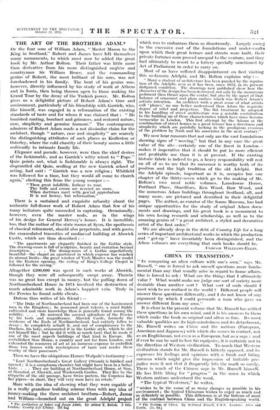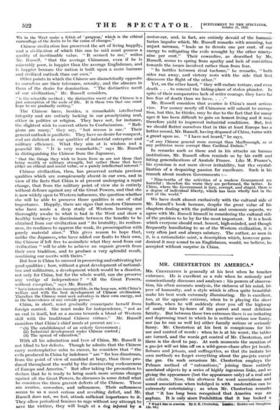CHINA IN TRANSITION.* " IN comparing an alien culture with
one's own," says Mr. Russell, " one is forced to ask oneself questions more funda- mental than any that usually arise in regard to home affairs. One is forced to ask : What are the things that I ultimately value ? What would make me judge one sort of society more desirable than another sort ? What sort of ends should I most wish to see realized in the world ? Different people will answer these questions differently, and I do not know of any argument by which I could persuade a man who gave an answer different from my own."
It is clear in the present volume that Mr. Russell has settled these questions in his own mind, and it is his answers to them which make the book so original and often so fine. Its most valuable qualities are its high-mindedness and its detachment. Mr. Russell writes on China and the nations (European,
American and Japanese) with which she comes in contact, not as an Englishman, not even as a European, but as a sage : and if ever he can be said to lose his equipoise, it is certainly not in the direction of Western civilization. To much that Western civilization stands for Mr. Russell is bitterly opposed, and he expresses his feelings and opinions with a frank and biting sarcasm which might give the impression of irritable pre-
judice were it not that it frequently hits the mark so surely. There is much of the Chinese sage in Mr. Russell himself. He has little liking for " progress " in the sense in which Western nations understand the word.
"The typical Westerner," he writes, " wishes to be the cause of as many changes al possible in his environment ; the typical Chinaman wishes to enjoy as much and as delicately as possible. This difference is at the bottom of most of the contrast between China and the English-speaking world.
• The Problem of China. By Bertrand Russell, F.R.S. London: Alien and Unwin. 17s. 811
We in- the West make a fetish of ' progress,' which is the ethical camouflage of the desire to be the cause of changes."
Chinese civilization has preserved the art of living happily, and a civilization of which this can be said must possess a quality of inestimable value. " It seemed to me," writes Mr. Russell, " that the average Chinaman, even if he is miserably poor, is happier than the average Englishman, and is happier because the nation is built upon a more humane and civilized outlook than our own."
Other points in which the Chinese are diametrically opposite to ourselves are their tolerance, serenity, and the absence in them of the desire for domination. " The distinctive merit of our civilization," Mr. Russell considers, " is the scientific method ; the distinctive merit of the Chinese is a just conception of the ends of life. It is these two that one must hope to see gradually uniting."
The Chinese have, besides, a remarkable intellectual integrity and are entirely lacking in our proselytizing zeal, either in politics or religion. They have not, for instance, the slightest wish to convert others to Confucianism. " Reli- gions are many," they say, " but reason is one." Their general outlook is pacifistic. They have no desire for conquest, and are deficient in our qualities of industrial enterprise and military efficiency. What they aim at is wisdom and a peaceful life. " It is very remarkable," says Mr. Russell in distinguishing the Chinese from the Japanese, " that the things they wish to learn from us are not those that bring wealth or military strength, but rather those that have either an ethical and social value, or a purely intellectual interest."
Chinese civilization, then, has preserved certain precious qualities which are conspicuously absent in our own, and in view of the facts that China is at present undergoing a rapid change, that from the military point of view she is entirely without defence against any of the Great Powers, and that she is now widely open to Western influences, the question whether she will be able to preserve those qualities is one of vital importance. Happily, there are signs that modern Chinamen who have made a deep study of Western learning are thoroughly awake to what is bad in the West and show a healthy tendency to discriminate between the benefits to be obtained from our civilization and " its brutality, its restless- ness, its readiness to oppress the weak, its preoccupation with purely material aims." This gives reason to hope that, unlike the Japanese, who have added our faults to their own, the Chinese if left free to assimilate what they need from our civilization " will be able to achieve an organic growth from their own tradition, and to produce a very splendid result, combining our merits with theirs."
But how is China to succeed in preserving and cultivating her good qualities ; how, without a great development of national- ism and militarism, a development which would be a disaster, not only for China, but for the whole world, can she preserve any vestige of independence ? " All the Great Powers, without exception," says Mr. Russell, " have interests which are incompatible, in the long run, with China's welfare and with the best development of Chinese civilization. Therefore the Chinese must seek salvation in their own energy, not in the benevolence of any outside power."
China, in short, must gradually emancipate herself from foreign control. She must make for independence, " not as an end in itself, but as a means towards a blend of Western skill with the traditional Chinese virtues." Mr. Russell considers that China's chief needs at present are :— " (1) The establishment of an orderly Government ; (2) Industrial development under Chinese control ; (3) The spread of education."
With all his admiration and love of China, Mr. Russell is not blind to her defects. Though he admits that the Chinese carry contemplative calm to excess, he considers that " the evils produced in China by indolence " are " far less disastrous, from the point of view of mankind at large, than those pro- duced throughout the world by the domineering cocksureness of Europe and America." But after taking the precaution to declare that he is ready to bring much more serious charges against all the Great Powers, he discusses in some detail what he considers the three gravest defects of the Chinese. These arc avarice, cowardice, and callousness. Their callousness
seems to us a most serious and revolting defect, and Mr. Russell does not, we feel, attach sufficient importance to it. They allow periodical famines to rage without any attempt to save the victims, they will laugh at a dog injured by a
motor-car, and, in fact, are entirely devoid of the humani- tarian impulse which, Mr. Russell remarks with amusing, but unjust sarcasm, " leads us to devote one per cent. of our energy to mitigating the evils wrought by the other ninety- nine per cent." Their cowardice, as described by Mr. Russell, seems to spring from apathy and lack of conviction towards the issues involved rather than from fear.
" In battles between rival tuchuns," he remarks, " both sides run away, and victory rests with the side that first discovers the flight of the' other."
Yet, on the other hand, " they will endure torture, and even death . . . to conceal the hiding-place of stolen plunder. In spite of their comparative lack of active courage, they have far less fear of death than we have. . .."
Mr. Russell considers that avarice is China's most serious vice. For money nearly all Chinamen will submit to corrup- tion, but this, he thinks, may be due to the fact that for many ages it has been difficult to gain an honest living and it may therefore yield to improved industrial conditions. But, lest we should flatter ourselves that in this at least Europe has a better record, Mr. Russell, having disposed of China, turns with a growl upon us. " I have not heard," he says, "of any Chinese general more corrupt than Marlborough, or of any politician more corrupt than Cardinal Dubois."
In remarks such as these and in his attacks on human institutions, Mr. Russell often reminds us by his swift and biting generalizations of Anatole France. Like M. France's, his cynicism is not mere clever irritability, but the crystal- lization of a despairing passion for excellence. Such is his remark about modern Governments :-
" Nine-tenths of the activities of a modern Government are harmful • therefore the worse they are performed, the better. In China, where the Government is lazy, corrupt, and stupid, there is a degree of individual liberty, which has been wholly lost in the rest of the world."
We have dealt almost exclusively with the cultural side of Mr. Russell's book because, despite the great value of his chapters dealing with the political and economic aspects, we agree with Mr. Russell himself in considering the cultural side of the problem to be by far the most important. It is a book which everyone should read, honest, high-minded, and though frequently humiliating to us of the Western civilization, it is very often just and always salutary. The author, as seen in it, is a rationalistic saint, a description which, however para- doxical it may sound to an Englishman, would, we believe, be accepted without surprise in China.



































































 Previous page
Previous page